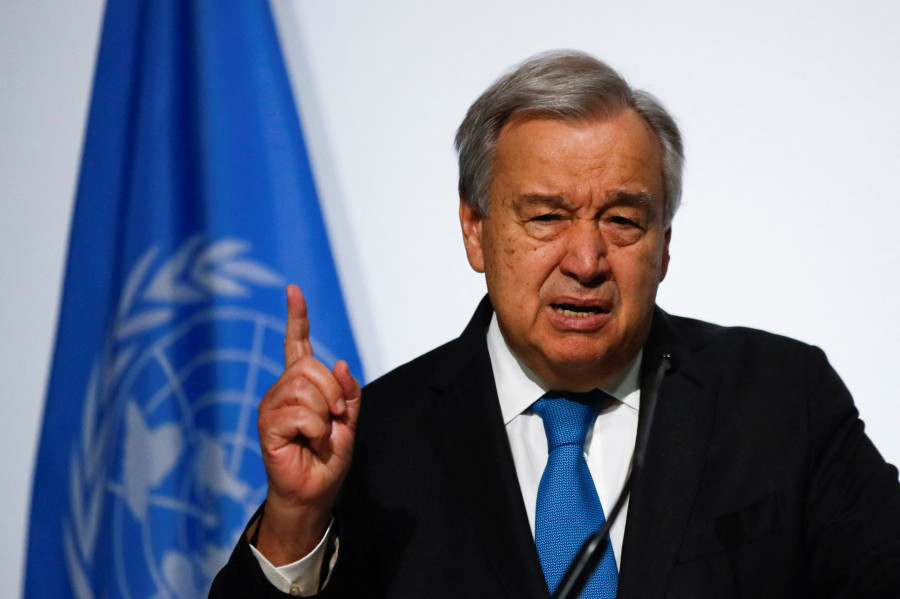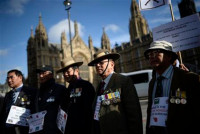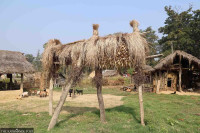National
Conflict victims ask UN chief to push for transitional justice
Say they are sceptical of PM’s commitment to justice.
Binod Ghimire
As Nepal’s protracted transitional justice process grinds on, the victims of the Maoist insurgency have urged the United Nations Secretary General Antonio Guterres to press the government to amend the Transitional Justice Act to ensure a victim-centric resolution.
A group of conflict victims’ representatives submitted their written concerns on Friday to Guterres through the UN Resident Coordinator’s Office in Kathmandu. They made the appeal to the UN chief a week ahead of his visit to Kathmandu. Guterres is visiting Nepal on October 13 on a four-day visit to discuss climate change and the peace process.
“We kindly request urge you to utilise the powers of your office to reiterate to the Government of Nepal the importance of expediting the resolution of Nepal's longstanding transitional justice concerns, amend the Act with the full incorporation of our concerns, ensure victim-centric and credible transitional justice process that thousands of victims finally receive the truth and justice they deserve," reads a point in the letter addressed to Guterres.
Guterres will arrive in Kathmandu next week on his maiden visit as secretary general and meet the prime minister, ministers, government officials and civil society members.
“We had long been planning to draw the attention of the UN secretary general. Coincidentally he is arriving in Nepal next week,” Suman Adhikari, a former chair of the Conflict Victims Common Platform who was present while submitting the letter to UN Resident Coordinator Hanna Singer-Hamdy, told the Post. “We expect that he will bring our concerns to the notice of the Nepal government.”
In their letter, the victims have recalled how successive governments remained reluctant to implement the promises of the 2006 Comprehensive Peace Agreement to end impunity, uncover the truth, and respect victims’ rights to justice.
“As a result of the absence of substantial justice, truth and reparative measures including adequate compensation, individuals affected by the conflict and their families have endured profound challenges in many aspects of their lives. Tragically, some of them have lost their lives while pursuing justice, and their descendants have taken up the cause in their memory while some are tragically living without treatment. Thousands of victims of murder, disappearance, sexual violence, beating and mutilation, torture and abduction, and hostage and displacement, longing for truth, justice, reparation and non-recurrence are tired of the repeated commitments that are yet not duly fulfilled,” the victims have said.
They have urged Guterres to be the voice of victims and raise the importance of a victims-centric transitional justice process to consolidate peace, democracy, rule of law and development in the country.
The victims say while they appreciate the commitment of Prime Minister Pushpa Kamal Dahal in the United Nations General Assembly that there would be no blanket amnesty for serious violations of human rights, they don’t trust him because they have been hearing such promises for a long time. “We have repeatedly heard similar commitments made during the UNGA and Human Rights Council’s sessions, a number of national and international forums, and government policies and programmes over a decade without doing much to fulfil those commitments. Thus, we, the thousands of conflict victims who are longing for the truth, justice and reparation over decades, are tired of no implementation of those commitments,” reads the letter.
The victims have informed the UN chief about how problematic the bill to amend the Enforced Disappearances Enquiry, Truth and Reconciliation Commission Act was.
At present, there is no clear roadmap, a credible plan of action and a timetable for its proper enactment. “We want the bill to be approved by Parliament only after making necessary amendments through a transparent and consultative process.”
The victims and the human rights defenders have registered serious objections to several provisions in the bill, which is under consideration by a sub-committee of the Law, Justice, and Human Rights Committee of Parliament. They argue that the bill neither honours the Supreme Court's 2015 verdict nor adheres to the international standard of transtional justice and Nepal's human rights obligations.
The victims say they have serious concerns about the bill's categorisation of violations committed during the conflict into 'human rights violations' and 'serious human rights violations,' which narrows the scope of serious violations.
Cruel and inhuman torture and murder with cruelty, rape, and enforced disappearance are categorised as serious human rights violations and made non-amnestiable crimes in the bill, whereas murder, sexual violence, beating and mutilation, torture and abduction, and hostage taking are categorized under human rights violations qualified for mediation, reconciliation and amnesty.
The “human rights violations” amount to gross violations of international human rights law and serious violations of international humanitarian law. “We have submitted time and again our concerns and suggestions for amendments to the bill, but we are frustrated that our concerns are largely ignored," according to the letter.
The victims' community also has concerns regarding the credibility and independence of the Recommendation Committee, which nominates candidates for chairpersons and members of both commissions. As most of the public institutions are now captured by cronies of political parties, undermining legitimacy of these institutions, the selection of commissioners with credibility, and the transparency in their appointment is critical, as per the letter.
Victims of sexual violence still have no confidence to report their cases to the Truth and Reconcilistion Commission in the lack of specialised victims and witness protection mechanisms and resources are envisioned in the Bill.
At the meeting, the victims requested Singer to arrange their meeting with Guterres. "She didn't outright promise such a meeting, but assured that she would make maximum efforts for it," said Adhikari.




 13.16°C Kathmandu
13.16°C Kathmandu















